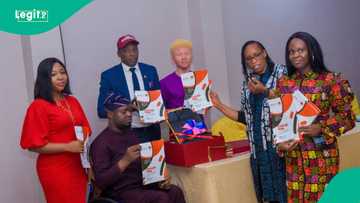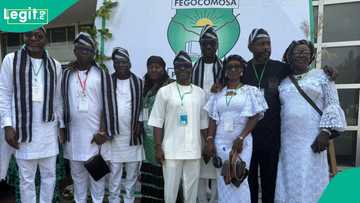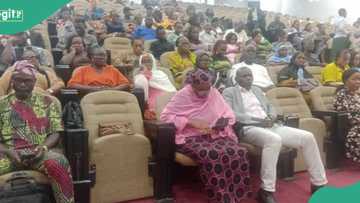Nigeria among few nations where most children start school in a foreign language, says NMEC boss
- The National Commission for Mass Literacy, Adult and Non-Formal Education (NMEC) called for the adoption of mother-tongue learning in non-formal education
- NMEC boss Dr John Onimisi Edeh said Nigeria is one of the few nations where most children start school in a foreign language, despite having over 500 indigenous languages
- Edeh said that teaching in local languages would improve literacy, boost confidence, and preserve cultural identity
Kano, Nigeria - The National Commission for Mass Literacy, Adult and Non-Formal Education (NMEC) has urged the government and education providers to embrace mother-tongue learning in non-formal education, warning that continued reliance on foreign languages is limiting progress in reducing illiteracy.
Speaking at a stakeholders’ meeting in Kano to mark International Literacy Day, the acting executive secretary of NMEC, Dr John Onimisi Edeh, said Nigeria stands out globally as one of the few countries where most children begin schooling in a foreign language.

Source: UGC
"Nigeria stands unique in the global community. We are one of the few nations where the majority of children begin their educational journey in a foreign language. Yet, we are home to one of the richest linguistic tapestries in the world, with over 500 distinct languages spoken across our communities," he said.
The NMEC boss explained that the Non-Formal Education sector has two prevailing assumptions in literacy delivery within multilingual settings, namely that instruction should be in the mother tongue for Basic Literacy Level and in a second or foreign language for Post Literacy Level.
He added that the greater the reliance on international languages of wider communication, the lower the expected achievement and the poorer the return on investment,” he said.
According to him, prioritising local languages in adult and non-formal education would help learners not only read and write, but also gain confidence and cultural pride.
Challenges in adult literacy in Nigeria
According to Edeh, adult literacy levels in Nigeria remain low, particularly in rural and conflict-hit areas, where many programmes still use dominant foreign or national languages.
“Indigenous languages are fading not because they lack value, but because they lack support,” he said.
“When we teach people in the language they understand best, we don’t just teach them to read, we teach them to believe in themselves.”
What NMEC is doing to promote mother-tongue - Edeh
Edeh said the commission is updating culturally relevant materials, engaging local authors, and training facilitators with strong language competence.
He added that the literacy agency has also set up community learning centres in 15 states and the Federal Capital Territory, using mother-tongue instruction with encouraging results.
In addition, radio literacy programmes in Hausa, Yoruba, Igbo and Kanuri are reaching learners in communities where formal schooling is scarce. New multilingual reading materials and posters are also being developed to sustain learning.
The NMEC boss stressed that literacy efforts must go beyond access to education and focus on relevance and empowerment.
“Language is not a mere tool of instruction; it is the heartbeat of identity, comprehension, and empowerment,” he said.
“If we are truly committed to inclusive development, we must embrace the linguistic diversity that defines us and use it as a lever for transformation.”
NMEC committed to inclusivity - Babajide
In his welcome address, NMEC’s acting director of Network Partnership and Mobilisation, Dr Williams Babajide, said the summit’s theme, “Literacy Without Borders: Multilingual Education as a Tool for Empowering Adults and Youths and Fostering Peace”, aligns with President Bola Tinubu’s commitment that no child or youth should be left behind.
He said the discussions aimed to generate practical strategies to overcome barriers to literacy and ensure that Nigerians, regardless of their language or location, are given the opportunity to learn.

Source: UGC
Yoruba language: Igbo women vow to sue Lagos govt
Meanwhile, Legit.ng previously reported that some women under the aegis of the Igbo Women Assembly (IWA), a pressure group, vowed to sue the Lagos state government led by Governor Babajide Sanwo-Olu.
The pressure group vowed to drag the Lagos state government to court over its legislation for the exclusive teaching of the Yoruba language in state-owned schools.
The News Agency of Nigeria (NAN) reported that IWA is affiliated with Ohanaeze Ndigbo, an apex Igbo socio-cultural organisation.
Source: Legit.ng






